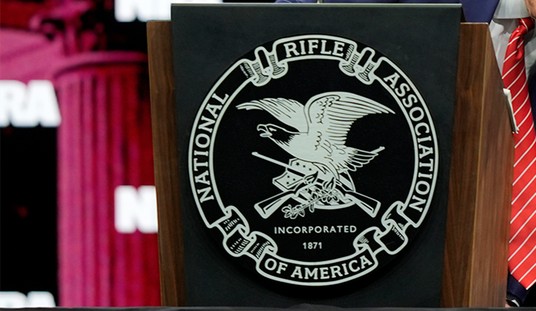The editors of Michael Bloomberg’s eponymous news outlet have a laughable op-ed out today in which they call on both Democrats and Republicans to leave legislating to lawmakers instead of asking banks to take a side in “culture war” fights over guns and fossil fuels, while pinning most of the blame (especially when it comes to the gun issue) on the right.
It’s an absurd claim on its face, given the fact that the entire reason why financial institutions like Bank of America and Citigroup began adopting policies that limit or exclude the firearms industry from the full range of their financial offerings came from an Obama-era initiative from Eric Holder’s DOJ called Operation Choke Point, which sought to harness the power of the DOJ and FDIC to bully banks to stop doing business with certain disfavored industries, including the firearms industry.
You won’t any mention of Operation Choke Point in today’s op-ed from the Bloomberg editors. Instead, their one-sided history starts with the recent responses from Republicans to the anti-gun policies of many major financial institutions.
More worryingly, Republican state legislators across the country are pushing for rules to protect favored companies against what they call unfair discrimination by the financial sector. Texas, for example, is denying municipal-bond deals to banks that officials deem to be “boycotting” gun makers. Other states are looking to punish lenders that they think are discriminating against fossil-fuel companies.
In polarized times, it’s a model that seems likely to spread — and to backfire. Using banks as a political bludgeon won’t further either side’s goals. Cutting off lending to energy companies would not only threaten to destabilize the financial system, but also cut off the power the country needs to transition to greener sources. And while state and local governments are of course entitled to decide who to do municipal-bond business with, excluding certain bidders from competition increases costs for taxpayers, and could coerce banks into lending to companies that they have legitimate commercial or reputational reasons to avoid.
Policy makers should instead be addressing issues such as climate change and guns head on — that is, through legislation. They should invest in clean energy and enact policies that increase the cost of actions that contribute to global warming. They should fund research on gun violence, tighten background checks and curb the modification of guns into assault weapons. Those who want to oppose such commonsense reforms should do so within the legislative process — not through proxies in the financial sector.
Bloomberg and his anti-gun buddies had no issue whatsoever with Operation Choke Point or the gun control groups that pressured banks into adopting policies that discriminated against the firearms industry. It’s only when states like Texas started fighting fire with fire that the editors of Bloomberg demanded a cease fire in the culture wars raging in the financial sector of the economy; probably because it’s not just Texas lawmakers who are expressing an interest in the tactic.
At least two other states (Kansas and Arizona) are also weighing legislation that would block state and local governments from doing business (to one degree or another) with banks that have policies discriminating against the firearms industry, and the measures are likely to become more widespread… at least until the banks themselves adopt a position of neutrality in the culture wars.
I don’t think that’s what Bloomberg’s editors are demanding, however. They seem to be just fine with banks cutting ties or imposing special restrictions on the firearms industry, which makes their current plea for a culture war ceasefire all the more hypocritical… and all the more likely to fall on deaf ears in Republican-led legislatures.









Join the conversation as a VIP Member